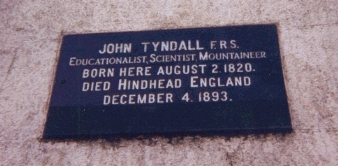
(1820 - 1893)
(1820 - 1893)
John Tyndall was born on August 2nd 1820, into
a small landowning family in
Leighlinbridge
, Co.Carlow.
Plaque commemorating Tyndall
on a wall near his house in Leighlinbridge
Although his family was
quite poor, Tyndall got a good education. He became good friends with
Master Conwill at Ballinabranna School, when he was in his teens.
The two could often be seen, on their walks home to
Leighlinbridge, figuring out some geometrical problems in the
snow. The house in Leighlinbridge
where John Tyndall was born in 1820
Tyndall originally started working as a
draughtsman with the Ordnance Survey, studying in his leisure
time. In 1847, he became a teacher of mathematics at Queenswood
College, Hampshire, England. Then at the age of 28 he went to the
University of Marburg
in Germany to study Chemistry and Physics.
In 1850 he obtained his Phd there, and returned to Queenswood a
year later.




The school in Ballinabranna where John Tyndall went, and a plaque in commemeration of him
Tyndall was known as a real experimental scientist who researched diverse and specialist areas of science. In 1853, he became Professor of Natural Philosophy (Science) at the Royal Institution . A year later, he started working alongside the great experimenter, Michael Faraday (1791-1867). In 1862, when Faraday died, Tyndall took over as Director of the Royal Institution.
In his position as lecturer, journalist and writer, Tyndall did much to popularise Science in Britain and the United States, where he toured from 1872-1873. He initiated the practical teaching of scientific subjects in schools. He also spent much time researching electromagnetic radiation in liquids and gases and was the founding father of this science of nephelometry , which is the basis of spectrometers and turbimeters.
He is best remembered for the Tyndall effect , which is the scattering of light by very small particles suspended in a medium. The discovery of this effect enabled Tyndall to explain "why the sky is blue". He is also responsible for laying the basis for Infra-red spectroscopy. His invention of the lightpipe led to the development of fibre optics in communication.
The fireman's respirator
that Tyndall invented
Tyndall also discovered that
ozone
absorbs 80%
of the sun's radiated heat, studied the propagation of sound in
air to develop better foghorns and invented the fireman's
respirator. This respirator
was the forerunner of all models developed to the present day. He also studied glaciers and was an avid
mountaineer. He travelled extensively in Europe, popularising the
sport of mountaineering. In 1863, he would have been the first to
climb the
Matterhorn
, but his guides refused to venture up the
last peak. Tyndall's alpine summer Nonetheless, he was the first man to climb the
Weisshorn
. He also climbed
Mont Blanc
, the highest alpine peak,
several times and pioneered solo ascents. The Tyndall memorial
(pictured below) was erected on Alp Lusgen in 1911 by his widow. The Tyndall
memorial on Alp Lusgen
In 1886, Tyndall became seriously ill and he
retired from the Royal Institution the following year. He died in
1893, at the age of 73, in Surrey, from an accidental overdose of
drugs administered by his wife Louise. The
Tyndallisation
sterilisation process and
"tyndall blue" are permanent legacies of his work. He
also helped to inaugurate the British scientific journal Nature.
John Tyndall was a great scientist contributing to many different
facets of science. Carlow County library hold books, papers and
manuscripts of John Tyndall, which will be on display in the
future. Tyndall had a fascination in the world around
him and in the philosophy of thought. Here are some famous quotes
by John Tyndall. "You urge, in vain, that science has
given us all the knowledge of the universe which we know possess,
while spiritualism has added nothing to that knowledge." "The wind is a musical instrument with
a certain range of tones, beyond which in both directions we have
an infinite silence." "The brightest flashes in the world of
thought are incomplete until they have been proven to have their
counterparts in the world of fact." 
Mountaineering:

house on Alp Lusgen, over 2100m, where he enjoyed splendid
views of the Matterhorn and the Weisshorn

Later life:
![]()
![]()
![]()